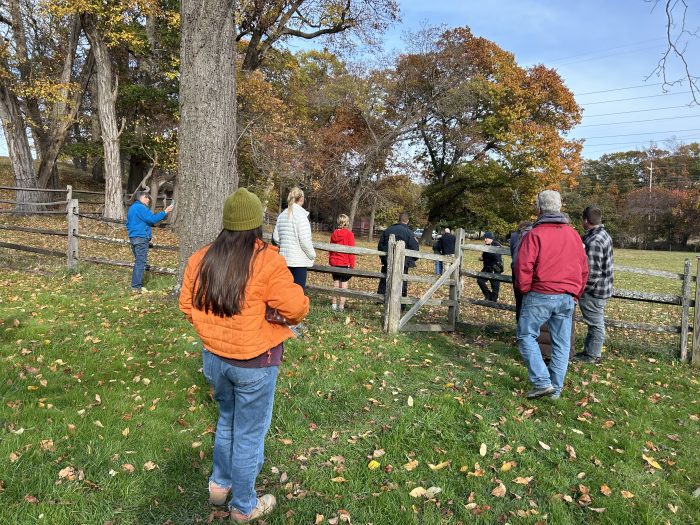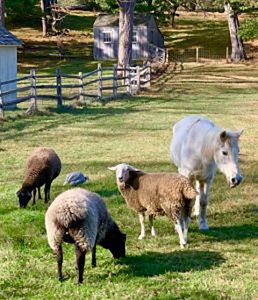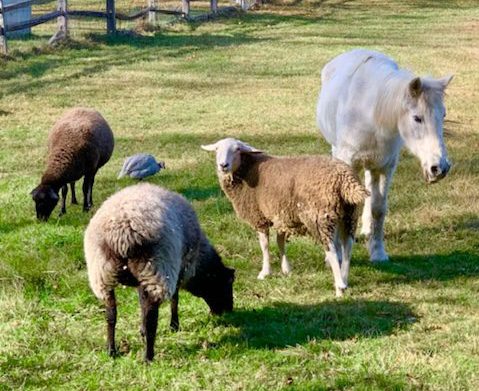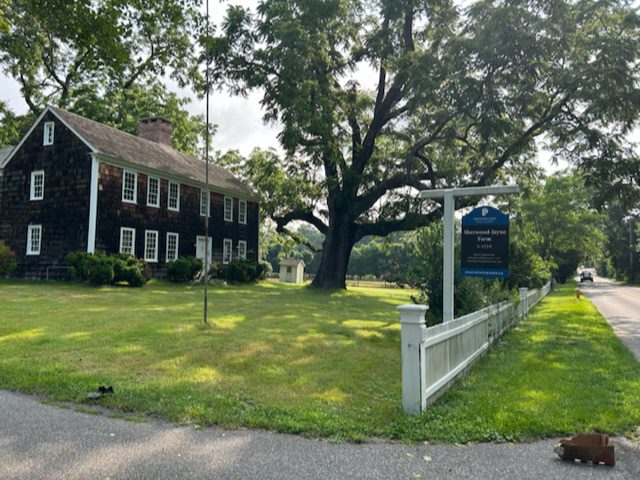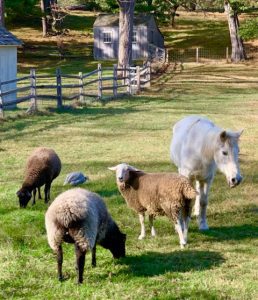Local residents rallied outside Sherwood-Jayne Farm in East Setauket Wednesday, Nov. 8, when representatives from Preservation Long Island — the nonprofit that owns the farm and its animals — made an unexpected attempt to remove the elderly pony and four sheep that live there.
The impromptu protest was confrontational and tense, with caretaker Susanna Gatz visibly distressed, and PLI executive director Alexandra Wolfe expressing frustration. Suffolk County police officers who cleared the 20 or so people out of the pasture area as requested by Wolfe also worked to maintain a calm atmosphere where possible.
In the end, the sheep and pony were spooked amid the tension, so the Save-A-Pet representative engaged to move the animals wouldn’t do so while they were agitated, and left the scene.
PLI has long planned to rehome its animals, but paused for review in August after significant community outcry. Gatz has lived on the property and cared for the sheep and pony for more than eight years. She and other local residents have been hoping the sheep and pony could live out the rest of their lives there.
On Nov. 8, Wolfe told Gatz the animals would leave just minutes before a Save-A-Pet van arrived to transport them.
Gatz said she felt blindsided. “To show up here today with a 15-minute notice to start moving the animals is not fair.”
Suffolk County Legislator-elect Steve Englebright (D-Setauket) attempted to help mediate and said he had a productive start to a conversation with Wolfe. He explained that the animals are an important educational and cultural resource for the community, but that he also understands PLI is essentially a collection of small museums and not in the business of caring for live creatures.
“She’s unhappy because the ownership that they have of these animals is not part of their mission,” he said, but added, “There has to be a solution other than removing the animals.”
Englebright said Wolfe expressed willingness for the idea of a separate organization owning and taking charge of animals on the property — though as police cleared people out of the pasture area and the protest grew heated with sobs, yelling and even a bit of shoving, Wolfe told the crowd she did not want the current animals to be part of any discussion.
Gatz’s sister, Sharon Philbrick, pulled three of her children out of school so they could come say goodbye to the animals, but police were no longer allowing people to go near the barn by the time they arrived. The kids were crying, and one ran past police officers to get close. “They’ve been around these animals their whole lives.” Philbrick said, adding that they’d held the sheep when they were little lambs. “The animals know them.”
PLI explained in a fact sheet provided to TBR News Media that the sheep are slated to get a private enclosure at Berkshire Farm Sanctuary, a nonprofit farm in Massachusetts that rescues and rehabilitates “abused and neglected companion and farm animals,” according to its website.
Snowball, the old white pony, PLI’s fact sheet indicated, would move to a private farm “a short distance away from the Sherwood-Jayne Farm,” and would have access to another elderly pony and 24-hour veterinary care.
PLI provided a statement Thursday suggesting it still planned to move the animals, without indicating when.
“Regrettably, the emotions of our property custodian and some protesters disrupted the attempt to gently move the animals yesterday, and that effort had to be paused. We continue to believe that Berkshire Farm Sanctuary will provide the humane and caring environment we seek for the grazing animals,” the statement read.
Compliance issues for Sherwood-Jayne
In an additional layer of complication for PLI, a Sept. 8 letter from the county procured by TBR News Media informed them the property is out of compliance with the Farmland Preservation Development Rights Program. Suffolk County and the Town of Brookhaven purchased development rights to the 10.6-acre farm parcel in 2003, requiring Sherwood-Jayne to maintain a working commercial farm. The county also owns the 36 acres directly north of the property.
A county statute about the program stipulates “no owner shall leave agricultural land uncultivated and not engage in agricultural production … for more than two consecutive years.”
The letter also informed PLI it needs to apply for special-use permits to host events like the recent Baseball on the Farm, and the nonprofit also needs to discontinue the practice of allowing nearby schools and camps to use the field for overflow parking.
According to PLI’s fact sheet, the organization met with Mikael Kerr, the county’s farmland and open space supervisor, Sept. 30 to talk through options of bringing the property into compliance with the program.
PLI has not provided details about those options, but it will need to create a plan to put forward for approval by the county’s farmland committee.
Though there was no indication the current animals staying at the farm would hinder that process, the effort to move the animals last Wednesday made clear the organization is so far not interested in rethinking the decision.
“We have made arrangements to rehome our animals to a private sanctuary, where they will peacefully live out the rest of their days in a beautiful, park-like environment,” PLI said in a statement.
But some area residents think the animals should stay. One protester, Judy Wilson, who has helped feed the animals during times Gatz needed coverage, twisted a lock of the pony’s coarse white tail she found in the grass as she watched the situation unfold.
“What has happened today is atrocious,” she said. “The animals don’t need rescuing.”
Herb Mones, land use chair of the Three Village Civic Association, also came to the farm to show support. He took issue with the way the nonprofit handled a delicate situation, because the last the community heard, the plan to move the animals was on pause.
“We are quite shocked that something like this would happen by any organization that depends upon Long Island communities’ support,” said Mones, who is also president of the Three Village Community Trust, another organization that acquires and preserves local properties of historical importance. “These are really actions that go beyond anything that’s reasonable. It just amazes me.”
Gatz said she was touched that so many neighbors and friends stopped by — some who noticed the commotion while driving by and others who got calls to support the effort to keep the animals at the farm.
“People love this place, and they care about these animals,” she said. “I want them to stay here. This is their home, and I don’t know why [PLI] doesn’t understand that.”

